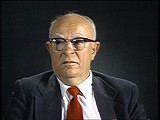You searched for: poland
<< Previous | Displaying results 1401-1425 of 1578 for "poland" | Next >>
-
Erika Eckstut
ArticleExplore Erika Eckstut's biography and learn about the difficulties and dangers she faced in the Czernowitz ghetto.
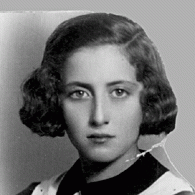
-
Jozef Tiso
ArticleJozef Tiso was a Slovak politician and a Roman Catholic priest. From 1939 to 1945, he was the president of the Slovak Republic, one of Nazi Germany’s allies.
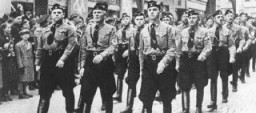
-
Hans Heimann describes Italian aid to Jews
Oral HistoryThe Germans annexed Austria in March 1938. In 1939, Hans fled first to Hungary and then to Italy. He and his parents were interned in various towns. Hans's father became ill and died in 1940. In 1943, Hans and his mother were warned of German plans to deport Jews from Italy to Poland. They moved to smaller towns until liberation by the British in August 1943. Hans worked as an interpreter for the Allies until 1945, when he worked for the American Jewish Joint Distribution Committee and helped resettle…
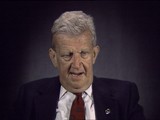
-
Alisa (Lisa) Nussbaum Derman describes joining the Nekama (Revenge) Jewish partisan unit led by Josef Glazman in the Naroch Forest
Oral HistoryLisa was one of three children born to a religious Jewish family. Following the German occupation of her hometown in 1939, Lisa and her family moved first to Augustow and then to Slonim (in Soviet-occupied eastern Poland). German troops captured Slonim in June 1941, during the invasion of the Soviet Union. In Slonim, the Germans established a ghetto which existed from 1941 to 1942. Lisa eventually escaped from Slonim, and went first to Grodno and then to Vilna, where she joined the resistance movement. She…
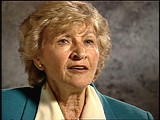
-
Dorotka (Dora) Goldstein Roth describes conditions in the Vilna ghetto
Oral HistoryAfter the Germans invaded Poland in 1939, Dora's family fled to Vilna, Lithuania. When the Germans occupied Vilna, Dora's father was shot and the rest of the family was confined in the Vilna ghetto. Dora, her sister, and her mother were deported to the Kaiserwald camp in Latvia and then to the Stutthof concentration camp near Danzig. Her mother and sister perished in Stutthof. Dora herself was shot immediately before liberation, but she survived.

-
Leo Schneiderman describes routine at the Ebensee camp
Oral HistoryThe Germans invaded Poland in September 1939. Leo and his family were confined to a ghetto in Lodz. Leo was forced to work as a tailor in a uniform factory. The Lodz ghetto was liquidated in 1944, and Leo was deported to Auschwitz. He was then sent to the Gross-Rosen camp system for forced labor. As the Soviet army advanced, the prisoners were transferred to the Ebensee camp in Austria. The Ebensee camp was liberated in 1945.
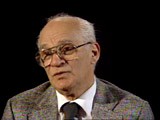
-
Bart Stern describes torture of prisoners during Hanukkah and a subsequent act of resistance to celebrate Hanukkah
Oral HistoryFollowing the German occupation of Hungary in March 1944, Bart was forced into a ghetto established in his home town. From May to July 1944, the Germans deported Jews from Hungary to the Auschwitz killing center in occupied Poland. Bart was deported by cattle car to Auschwitz. At Auschwitz, he was selected to perform forced labor, drilling and digging in a coal mine. As Soviet forces advanced toward the Auschwitz camp in January 1945, the Germans forced most of the prisoners on a death march out of the…
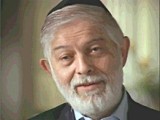
-
Sandor (Shony) Alex Braun describes how music gave him the strength to survive while imprisoned in concentration camps
Oral HistoryShony was born to religious Jewish parents in a small Transylvanian city. He began to learn the violin at age 5. His town was occupied by Hungary in 1940 and by Germany in 1944. In May 1944, he was deported to the Auschwitz camp in Poland. He was transferred to the Natzweiler camp system in France and then to Dachau, where he was liberated by US troops in April 1945. In 1950, he immigrated to the United States, and became a composer and a professional violinist.
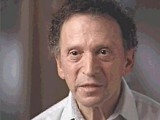
-
Leo Melamed describes life as a refugee
Oral HistoryLeo was seven years old when Germany invaded Poland in September 1939. Before the war, Leo's father was a mathematics teacher and member of the Bialystok City Council. Fearing arrest, Leo's father fled Bialystok for Vilna just before the German occupation. Leo and his mother eventually joined his father in Vilna. After the Soviets occupied Vilna, Leo's father obtained transit visas to Japan. The family left Vilna in December 1940, traveled across the Soviet Union on the Trans-Siberian Express, and arrived…
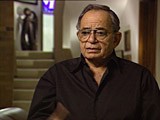
-
Leo Melamed describes train ride across the Soviet Union
Oral HistoryLeo was seven years old when Germany invaded Poland in September 1939. Before the war, Leo's father was a mathematics teacher and member of the Bialystok City Council. Fearing arrest, Leo's father fled Bialystok for Vilna just before the German occupation. Leo and his mother eventually joined his father in Vilna. After the Soviets occupied Vilna, Leo's father obtained transit visas to Japan. The family left Vilna in December 1940, traveled across the Soviet Union on the Trans-Siberian Express, and arrived…
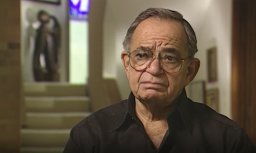
-
Alexander Schenker describes working as a lumberjack in a labor camp in Siberia
Oral HistoryFollowing the German invasion of Poland in September 1939, Alexander and his family fled eastward to Lvov. His father then fled to Vilna, hoping to obtain visas for the family to escape through Japan. The rest of the family was caught while trying to cross border into Lithuania in order to meet up with Alexander's father. They returned to Lvov. Alexander and his mother were later arrested for refusing to declare Soviet citizenship. They were sent to a labor camp in the Soviet interior. After their release…
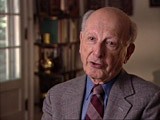
-
Francis Akos describes experiences in the immediate aftermath of the Holocaust
Oral HistoryAfter the Germans occupied Hungary in March 1944, Francis was deported to Neuengamme, a concentration camp located on the outskirts of Hamburg, Germany. Later, as Allied forces advanced, Francis and other prisoners were transported from Neuengamme. They were placed on a cargo ship which sailed into Luebeck Bay, where the prisoners were crowded onto the "Cap Arcona." The "Cap Arcona" and other ships were bombed in early May 1945. Francis was rescued and came ashore in the German town of Neustadt, where…
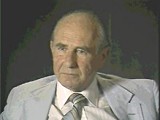
-
Mayer Adler describes surviving as a child in Auschwitz
Oral HistoryMayer grew up in a rural town that was occupied by Hungary in 1940. After Germany occupied Hungary in March 1944, Mayer and his family were forced into a ghetto. They were then deported to the Auschwitz camp in Poland, where Mayer's parents and brothers perished. Mayer was selected for forced labor, and was later transferred to a satellite camp of Dachau, in Germany. He was liberated from Dachau in 1945. Sponsored by a children's committee, he immigrated to the United States.
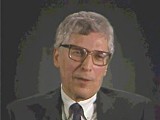
-
Mayer Adler describes his family's preparations for deportation
Oral HistoryMayer grew up in a rural town that was occupied by Hungary in 1940. After Germany occupied Hungary in March 1944, Mayer and his family were forced into a ghetto. They were then deported to the Auschwitz camp in Poland, where Mayer's parents and brothers perished. Mayer was selected for forced labor, and was later transferred to a satellite camp of Dachau, in Germany. He was liberated from Dachau in 1945. Sponsored by a children's committee, he immigrated to the United States.
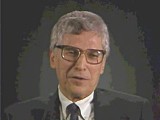
-
Leopold Page describes meeting German industrialist Oskar Schindler
Oral HistoryLeopold was a teacher in Krakow, Poland, when World War II began in 1939. While serving in the Polish army, he was captured by Germans. Leopold escaped from a prisoner-of-war transport. Soon after, he met the German industrialist Oskar Schindler. The two became friends. Leopold was forced to live in the Krakow ghetto. He later worked in Schindler's factory in Bruennlitz. He and the other Jews who worked there were treated relatively well and protected from the Nazis. After the war, Leopold moved to the…
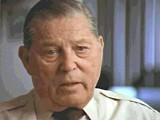
-
Ludmilla Page describes German industrialist Oskar Schindler
Oral HistoryLudmilla was born to an assimilated Jewish family in Kishinev, Romania. She and her mother, a physician, were living in Poland when the Germans invaded on September 1, 1939. They were taken to Krakow. Ludmilla was forced to live in the Krakow ghetto; her mother was sent to the Warsaw ghetto. Ludmilla worked in a factory at the Plaszow labor camp for a businessman who was a friend of the German industrialist Oskar Schindler. In October 1944, Schindler attempted to save some Jewish workers by relocating them…
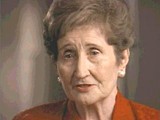
-
Sam Itzkowitz describes a death march from Landsberg, a subcamp of Dachau, to the Bavarian Alps
Oral HistoryThe Germans invaded Poland in September 1939. When Makow was occupied, Sam fled to Soviet territory. He returned to Makow for provisions, but was forced to remain in the ghetto. In 1942, he was deported to Auschwitz. As the Soviet army advanced in 1944, Sam and other prisoners were sent to camps in Germany. The inmates were put on a death march early in 1945. American forces liberated Sam after he escaped during a bombing raid.
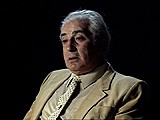
-
Leo Melamed describes going to school in prewar Bialystok
Oral HistoryLeo was seven years old when Germany invaded Poland in September 1939. Before the war, Leo's father was a mathematics teacher and member of the Bialystok City Council. Fearing arrest, Leo's father fled Bialystok for Vilna just before the German occupation. Leo and his mother eventually joined his father in Vilna. After the Soviets occupied Vilna, Leo's father obtained transit visas to Japan. The family left Vilna in December 1940, traveled across the Soviet Union on the Trans-Siberian Express, and arrived…
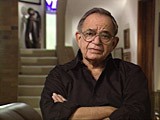
-
Leo Melamed describes speaking several languages as a child in prewar Bialystok
Oral HistoryLeo was seven years old when Germany invaded Poland in September 1939. Before the war, Leo's father was a mathematics teacher and member of the Bialystok City Council. Fearing arrest, Leo's father fled Bialystok for Vilna just before the German occupation. Leo and his mother eventually joined his father in Vilna. After the Soviets occupied Vilna, Leo's father obtained transit visas to Japan. The family left Vilna in December 1940, traveled across the Soviet Union on the Trans-Siberian Express, and arrived…
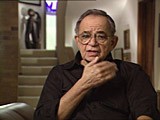
-
Leo Melamed describes the German occupation of Bialystok
Oral HistoryLeo was seven years old when Germany invaded Poland in September 1939. Before the war, Leo's father was a mathematics teacher and member of the Bialystok City Council. Fearing arrest, Leo's father fled Bialystok for Vilna just before the German occupation. Leo and his mother eventually joined his father in Vilna. After the Soviets occupied Vilna, Leo's father obtained transit visas to Japan. The family left Vilna in December 1940, traveled across the Soviet Union on the Trans-Siberian Express, and arrived…
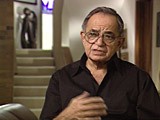
-
Leo Melamed describes fear after German occupation of Bialystok
Oral HistoryLeo was seven years old when Germany invaded Poland in September 1939. Before the war, Leo's father was a mathematics teacher and member of the Bialystok City Council. Fearing arrest, Leo's father fled Bialystok for Vilna just before the German occupation. Leo and his mother eventually joined his father in Vilna. After the Soviets occupied Vilna, Leo's father obtained transit visas to Japan. The family left Vilna in December 1940, traveled across the Soviet Union on the Trans-Siberian Express, and arrived…
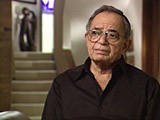
-
Leo Melamed describes fleeing by train from Bialystok to Vilna
Oral HistoryLeo was seven years old when Germany invaded Poland in September 1939. Before the war, Leo's father was a mathematics teacher and member of the Bialystok City Council. Fearing arrest, Leo's father fled Bialystok for Vilna just before the German occupation. Leo and his mother eventually joined his father in Vilna. After the Soviets occupied Vilna, Leo's father obtained transit visas to Japan. The family left Vilna in December 1940, traveled across the Soviet Union on the Trans-Siberian Express, and arrived…
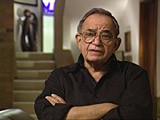
-
Bella Jakubowicz Tovey describes antisemitic remarks made as she was forced to march into the Graeben camp
Oral HistoryBella was the oldest of four children born to a Jewish family in Sosnowiec. Her father owned a knitting factory. After the Germans invaded Poland in 1939, they took over the factory. The family's furniture was given to a German woman. Bella was forced to work in a factory in the Sosnowiec ghetto in 1941. At the end of 1942 the family was deported to the Bedzin ghetto. Bella was deported to the Graeben subcamp of Gross-Rosen in 1943 and to Bergen-Belsen in 1944. She was liberated in April 1945.
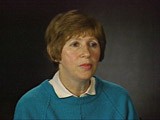
-
Dorotka (Dora) Goldstein Roth describes retaliation against women for an escape from Stutthof
Oral HistoryAfter the Germans invaded Poland in 1939, Dora's family fled to Vilna, Lithuania. When the Germans occupied Vilna, Dora's father was shot and the rest of the family was confined in the Vilna ghetto. Dora, her sister, and her mother were deported to the Kaiserwald camp in Latvia and then to the Stutthof concentration camp near Danzig. Her mother and sister perished in Stutthof. Dora herself was shot immediately before liberation, but she survived.
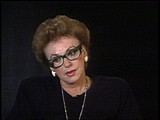
-
Joseph Stanley Wardzala describes forced labor in Hannover
Oral HistoryJoseph and his family were Roman Catholics. After Germany invaded Poland in 1939, roundups of Poles for forced labor in Germany began. Joseph escaped arrest twice but the third time, in 1941, he was deported to a forced-labor camp in Hannover, Germany. For over four years he was forced to work on the construction of concrete air raid shelters. Upon liberation by US forces in 1945, the forced-labor camp was transformed into a displaced persons camp. Joseph stayed there until he got a visa to enter the…
